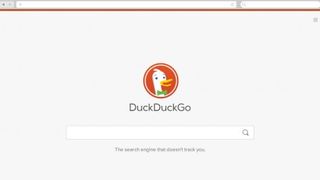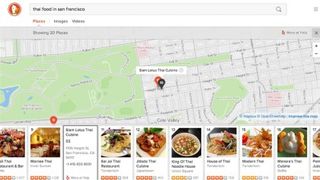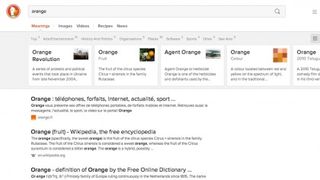DuckDuckGo: the private search engine that's got Apple's seal of approval
Secure searching without the nasty side effects - no wonder Apple's a fan

Search engines are curious things. Before Google, getting around the web was a complex and difficult process. Discovering services and websites was tricky, as was finding out information. An internet user now would certainly struggle to find their way around the web if search engines were gone and emphasis was placed on URLs instead. Google has become so ingrained in the psyche of internet users that "Google" has become a verb, dropping into everyday dialect and reinforcing the entrenchment of the company.
Everyday Google gets three quarters of a billion people visiting its pages making it the number one website in the U.S and, in the process, giving it near unlimited wealth and power. Last year Google made $57 billion in revenue of which $14 billion is profit. With all this power comes great responsibility; everyday nearly a billion people visit Google and rely on the algorithms that Google provides to give them fair, balanced results.
Something as simple as becoming 'unlisted' from Google results can annihilate traffic and sink a business. Whole businesses have grown out of 'gaming' Google search results with 'experts' charging clients for knowledge on how to rank higher on the page. It is hard to overstate the power that Google has over the modern internet.
Do not track
Google isn't without its detractors and sceptics, however, and Gabriel Weinberg is one of them. In 2006, Weinberg sold The Names Database—an early social network—to Classmates.com for $10 million and decided to start a new venture. Instead of creating another social network, Weinberg took a look at the search space and decided that something was missing.
That something took the form of DuckDuckGo, "the search engine that doesn't track you." Amongst many of Google's practices, Weinberg takes the highest offence at something he calls the "filter bubble", a process by which search engines—specifically Google—'filter' search results based on past searches, location and other information gained through a myriad of means.

In an interview I conducted with Weinberg last year, he described a "natural conflict" between Google's results and business model. How can Google display fair, unbiased results when advertisers are clamouring to raise their rankings? The answer, according to Weinberg, is that they cannot.
"If you look at the logs of people's search sessions, they're the most personal thing on the internet," Weinberg told Fast Company. "[People are] not thinking about the privacy implications of [their] search history," he concludes. In short, people simply search in blissful ignorance of the danger they could face. While someone at the faceless corporation that is Google doesn't specifically trawl every search, whatever you type into the search box is used to promote adverts to you and, in the event of a hack, could be used against you. Weinberg wants to avoid this and takes a "no holds barred" approach to not tracking users and he means it.
Get daily insight, inspiration and deals in your inbox
Get the hottest deals available in your inbox plus news, reviews, opinion, analysis and more from the TechRadar team.
Tales from the encrypt
All DuckDuckGo searches are encrypted using the most up-to-date encryption standards, a fact Weinberg is immensely proud of. This enables DuckDuckGo to categorically state that it does not track the searches of users and mean it.

The Snowden revelations have put privacy back into the public's collective mind and have, according to Weinberg, been great for the company's expansion. "DuckDuckGo received over a billion searches last year and we've tripled our searches since last summer when the NSA revelations began," Weinberg told me. This kind of explosive growth, usually reserved for social networks and the like, shows that there is a market for über-privacy conscious services.
"[The focus] was extreme at the time," Weinberg told Fast Company. "And it still may be considered extreme by some people, but I think it's becoming less extreme nowadays. In the last year, it's become obvious why people don't want to be tracked."
The clientele of DuckDuckGo is still mainly reserved for those who know the difference between HTTP and HTTPS, however. The mainstream media reporting Snowden's NSA leaks has certainly boosted the profile of privacy conscious services but there is still a long way to go. When asked what Weinberg tells people who are sceptical of the need for privacy, he replied that he tells them to "make sure [they] completely understand the implications on how [their] data is being used." One example Weinberg gives is Google showing ads to a user when they visit different sites based on passed search history and inflating the price of something because the user is richer or more affluent, a practice that DuckDuckGo would never follow.

DuckDuckGo a business, not a charity and it must make money somehow; the way Weinberg has chosen is advertising. Since the search engine does not track users it is impossible to create advertising on the scale or specificity of Google but DuckDuckGo takes a different path. The adverts are based on the search term typed rather than previous searches, so if 'car' is typed an advert for a car appears.
The largely technically savvy user base that DuckDuckGo has are naturally adverse to adverts but revenue was estimated at around $115,000 in 2011, $350,000 in 2013 and $840,000 in the first five months of 2014. If growth continues at its current rate (266% y/o/y with the majority of that growth happening directly after the Snowden revelations) DuckDuckGo will be on track to make tens of millions of dollars per year, all without violating a single user's privacy or targeting a single ad.
Search relevant
DuckDuckGo is constantly moving forward, updating its design in May 2014 to include new search-relevant information right from the search results. DuckDuckGo calls this 'Instant Answers,' and they cover a range of topics from meanings to recipes to maps. According to Weinberg, his "grand vision" is to get Instant Answers into "80% of queries, even for very niche things."
The beauty of these additions is that, while they improve the search experience, the main reason a user will visit DuckDuckGo is privacy and so if Google attempts to mimic Instant Answers users will not feel compelled to leave the service.

At Apple's recent WWDC event, the search engine was given a massive boost with the announcement that it will become part of Safari. When the latest editions of Mac OSX Yosemite and iOS 8 are released, this will become an option that users can choose.
Post-Snowden the internet is in a difficult place in terms of privacy and DuckDuckGo provides a valuable service where users can guarantee that no one is tracking, or can track, their searches and glean information from them. Gabriel Weinberg and his team are taking Google head on and appear to be succeeding.
Max Slater-Robins has been writing about technology for nearly a decade at various outlets, covering the rise of the technology giants, trends in enterprise and SaaS companies, and much more besides. Originally from Suffolk, he currently lives in London and likes a good night out and walks in the countryside.
Most Popular

